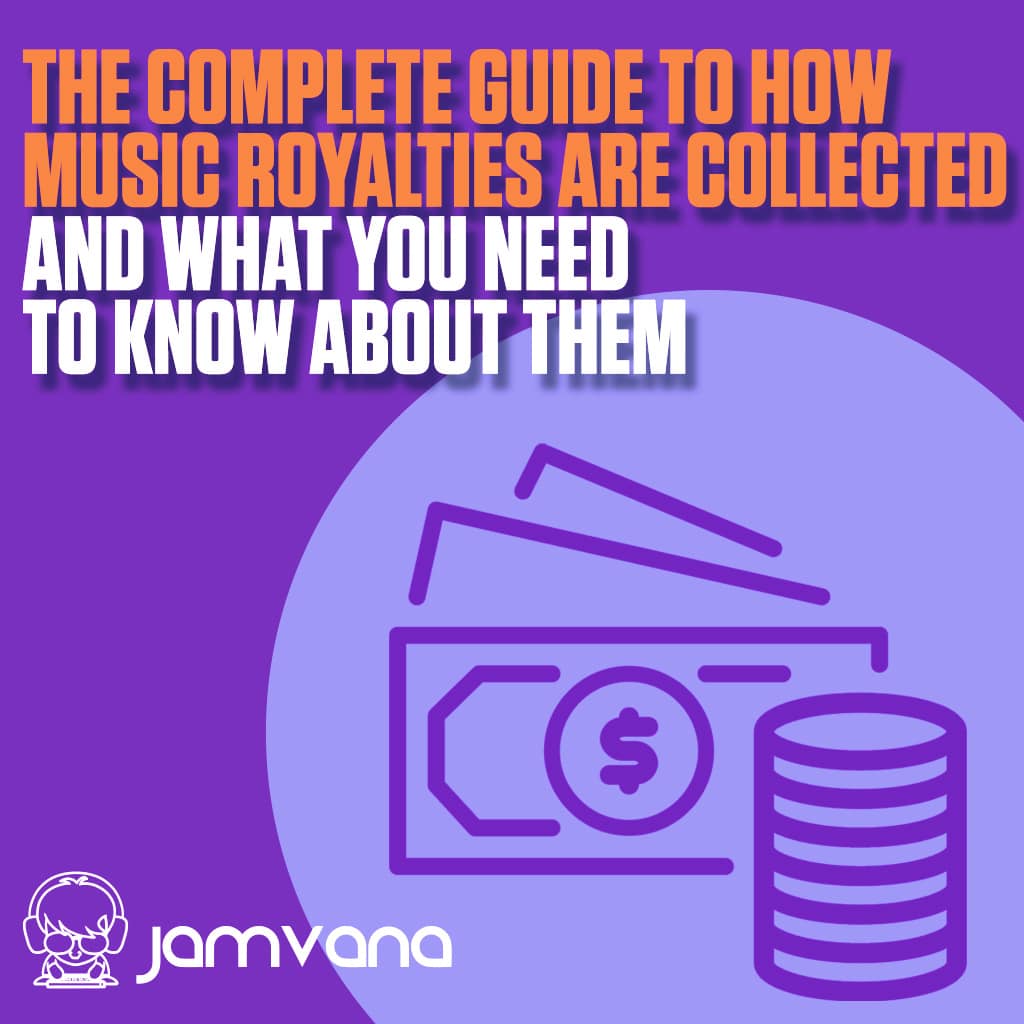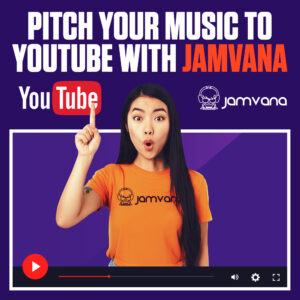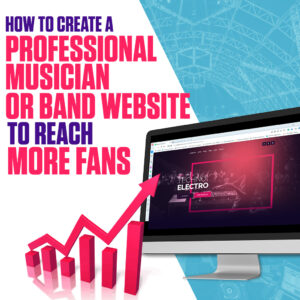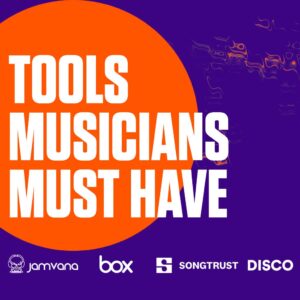What are music royalties? Who collects them? Who receives them? How do I collect ‘em all, like Pokémon?
Music royalties are a complicated topic in the music industry, and things are constantly evolving. Apple Music, for example, pays a different amount of royalties than Spotify, TIDAL, and other digital service providers. Once those royalties are collected by your distributor, they need to be allocated to the appropriate copyright holders. But how much? When? Do I only need a music distributor to collect all of my royalties?
These are the questions we’re going to be answering in this blog post.
What are music royalties and who gets them?
Music royalties are the fees that an artist earns for their work when it is played on the radio, streamed on a streaming service, or downloaded on Beatport, among other things. They are paid by streaming services, radio stations, TV networks, and other companies or artists who play an artist’s music in a public setting. The keyword here is public. Performing a song or playing a song on Spotify for a private birthday party at your house is not a public performance; therefore, you do not need to acquire the proper licenses to play it. Performing that song at a club or coffee shop is a public performance and requires the proper license and permission from the copyright holders.
Royalties paid out by streaming services to music distributors is set on a per-song basis and it is usually paid out to the master copyright owner(s), which is typically the artist or label. Songwriter(s) and publisher(s) are also paid, but they are not paid by the distributor. However, some music distributors have the ability to collect and pay out mechanical royalties.
Songwriters can also earn a percentage of revenue from concerts where their songs are performed live or from merchandise sales if they have signed an exclusive publishing agreement with a particular company. These are called “360 deals.”
If you’re an artist and performing your music publicly at a local venue, you can earn royalties. That’s considered a public performance, and you should submit a setlist to your PRO ahead of time.
5 Different Types of Music Royalties and How They are Collected
Musicians are entitled to different types of royalties for their work. These royalties are collected by different entities, and the amount that is paid to the musician varies from one type of royalty to another.
Let’s take a look at the different types of royalties and how they’re collected.
Mechanical Royalties: This type of royalty is collected by a mechanical rights administrator on behalf of the songwriter or composer. In the United States, it’s the Mechanical Licensing Collective. Songtrust also collects these royalties, so if you’re registered with them you do not need to sign up to the MLC. The mechanical royalty is typically paid every time a song is streamed or sold. The amount that is paid can vary depending on a number of factors such as streaming vs. digital sales, international rates, etc.
Performance Royalties: This type of royalty is collected by performing rights organizations, such as ASCAP, BMI, and SESAC, who collect money for public performances like radio broadcasts, TV broadcasts, live performances in theaters and nightclubs, etc. This money will go directly to the songwriters and not the publishers. However, according to Royalty Exchange, this landscape is changing, and publishers are wanting a bigger piece of the pie. The amount that you get paid for a song on Spotify, for example, depends on which country you’re in, but it’s typically between $0.00055 and $0.017 per stream, according to iGroove.
Streaming Royalties: A “streaming royalty” is a royalty that is paid to the sound recording copyright owner(s) and is negotiated between music distributors and streaming services. Every distributor negotiates a different rate, and this information is typically not publicly available. The streaming services commonly pay out 50% of their revenue to the artists on their platform, according to Soundcharts. This revenue is then split up amongst all of the artists. “The split is determined by ‘share of content’ or the number of streams a given artist has on the platform divided by all streams on the platform,” per Soundcharts.
Neighboring Rights/Digital Performance Royalties: This one’s a little confusing, but neighboring rights are similar to the public performance royalties that are paid to songwriters, except these royalties are paid out to the sound recording owners for public performances. In the United States, terrestrial radio does not pay out these royalties. Other countries do. Non-interactive streams (Pandora, SiriusXM) do earn royalties. Neighboring rights can also be considered “digital performance royalties,” but they do have a few slight differences. The organization that collects the digital performance royalties is SoundExchange.
Still confused? Sign up to our email list, and we’ll send you our music distribution checklist. It will walk you through every organization you need to sign up with and register your music.
How Digital Platforms Have Changed the Way We Collect Royalties
The music industry has changed drastically over the last few decades, and it’s only going to continue changing at a rapid pace. Digital service providers turned the music industry on its head and forced a paramount revolution in the music business.
Artists and labels didn’t have to focus on selling physical products anymore. They could distribute music to Spotify and have an infinite amount of people listen to the music without ever running out. Every time that music is streamed or downloaded (back in the days of iTunes) the artists, labels, songwriters, and publishers would get paid.
The industry at large has made significant strides towards this digital world, but legislatively it’s years behind. However, we are beginning to see progress.
Digital Services That Pay the Most for Artists’ Royalties
With the music industry constantly being in an ever-evolving state, streaming services are constantly updating and revising the amount that they pay out to the artists and songwriters on their platforms.
According to Producer Hive, the five highest paying streaming services are TIDAL, Apple Music, Amazon Music, Spotify, and YouTube Music.
TIDAL: $0.01284 per stream
Apple Music: $0.008 per stream
Amazon Music: $0.00402 per stream
Spotify: $0.00318 per stream
YouTube Music: $0.002 per stream
Note: This is only for the streaming royalties and not for mechanicals, publishing, or performance royalties.
How do I get paid for my songs?
There are multiple ways that musicians can collect all royalties for their songs. One way is to register with a PRO (Performing Rights Organization) like ASCAP, BMI, and SESAC. Another way is to register with SoundExchange, which we discussed above. They’ll collect the digital performance royalties for the sound recordings.
Registration with a PRO allows you to collect royalties for broadcast performances of your song, such as on TV or radio.
You’ll also want to register with a music distributor, like Jamvana, in order to release your music to the streaming services and collect your royalties.
Registration with these organizations provides you the best opportunity to start collecting your royalties, but there are more.
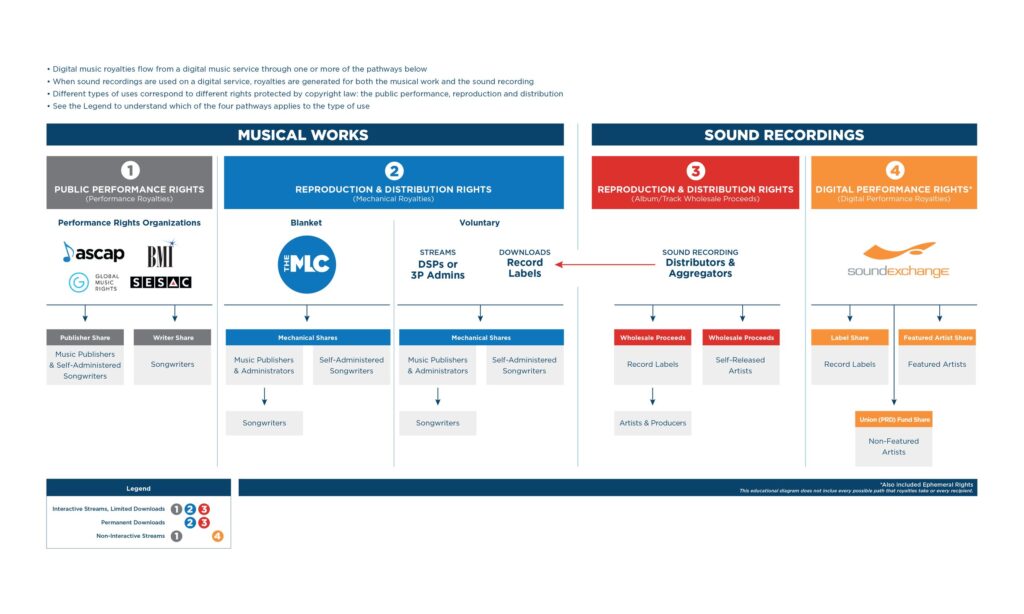
Sign up to our email list to receive a free PDF guide with all of the organizations you should register with to collect all of your royalties.
Conclusion
Music royalties are a complicated topic in the music business, but they’re vital for all music professionals to understand. Signing up and registering with the appropriate organizations now will alleviate any stress and confusion later down the road when you get that smash hit—or career changing sync placement.
